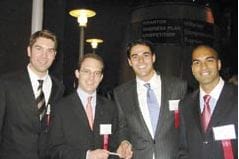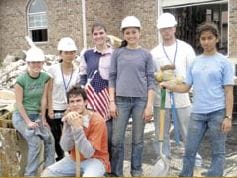
Musclemorph’s Kevin Galloway, Rodrigo Alvarez, Howard Katzenberg, and Rahul Kothari
Student team MuscleMorph carried away the top prize from the Wharton Business Plan Competition (WBPC), continuing the biotechnology sector’s prominence as the hottest industry in the WBPC. The grand prize winner in five out of the past six years has been a biotech (as were five out of this year’s great eight finalists).
MuscleMorph plans to enhance prosthetics with a patent-pending device that uses electro-active polymers to convert electrical energy into mechanical energy. The team impressed the judges with a technologically advanced motor that is lighter, higher performing, and more cost efficient than any currently offered, earning the $20,000 grand prize. The prize was awarded at the Wharton School’s annual Venture Finals April 25, 2006, where student finalists received a total of $70,000 in combined cash prizes, access to capital and in-kind legal/accounting services. The students of MuscleMorph, which already won the grand prize of PennVention 2006 — an invention competition sponsored by the University of Pennsylvania’s Weiss Technology House — include Rahul Kothari, WG’06, of Aurora, ON; Howard Katzenberg, WG’06, of Rockland County, NY; Kevin Galloway, a University of Pennsylvania PhD candidate in engineering from Lake Stevens, WA; and Rodrigo Alvarez, a Penn alumnus from Mexico City.
The second prize of $10,000 and the Frederick H. Gloeckner Award ($5,000 for highest-ranking undergraduate team) went to IntelliStem, which plans to market hip implants that use electrical stimulation to prevent pain associated with bone loss. The third prize of $5,000 went to Home-Base, a call-center outsourcing agency that hires spouses of active military personnel as agents working out of their own homes.
Over the years, the Wharton Business Plan Competition has seen numerous student teams go on to become successful businesses including PayMyBills.com, BuySafe, NetConversions, Stata Labs, DealMaven, Verge Solutions, and MicroMRI. In fact, grand prize winners from four of the past five years are still in business.
Dean Harker on Joseph Wharton’s Vision for Business Schools
Is business just about making money? Is business school just about credentialing managers by imprinting them with a set of practical skills?
Not according to Dean Patrick Harker — or Joseph Wharton. Harker reveals that Wharton’s vision for business schools is surprisingly fresh and relevant through an essay published in the March newsletter of the Association to Advance Collegiate Schools of Business (AACSB).
As business school education celebrates its 125th birthday with the anniversary of the Wharton School’s founding, Harker continues the discussion on the role of business schools. While the business of business education is competitive in nature, he calls for “a rededication to historic ideals” among the leaders of business schools. He writes, “We share a common mission as business educators: to apply the intellectual resources of our faculties to continued research and teaching, conducted with a deep engagement with business practice, and to instill in our students the values of trust and stewardship, of respect and service in the conduct of business.”
In Joseph Wharton’s original vision, business was a service profession. To Harker, it still is. “I believe the biggest challenge we face is the danger of forgetting the true purpose of business,” he writes. “It is not just about making money. It is about making people’s lives better and unleashing human potential. It is about creating opportunity for every member of our global society to enjoy security and freedom.”
Published by the international accrediting body for business schools, AACSB newsletter is sent to senior administrators at more than 1,000 business schools in 70 countries. To read the full text, please visit www.aacsb.edu/publications/enewsline/Vol-5/Issue-3/dc-Harker.asp.

The Cajun Cleanup Crew: Back Row: Kristen Patton, Dimian (Connie) Wu, Erica Lederman, Allison Strouse, Peter Stevens, and Rina Thomas. Front: Carlos Buitelaar
“Seeing and hearing the devastation first hand has made us all motivated to keep the issue of Katrina alive today,” says Allison Strouse, W’07. Strouse was one of 14 undergraduates who took part in a Wharton Council volunteer trip organized by Louisiana native Rina Thomas, W’08, to help the relief efforts in New Orleans. Enabled by a sponsorship from Deutsche Bank, from May 7 to 13 the students cleaned homes that had been devastated by Hurricane Katrina.
“We gutted houses in the morning and consulted small businesses in the evening with the help of Dr. Michael Cusack at the University of New Orleans’ Small Business Development Center,” says Thomas, whose group dubbed itself the Cajun Cleanup Crew. “This trip had all the right stuff—experiential learning, team building, community building, community service. We now have 14 students who are fired up about continuing these efforts.”
Learning Innovations: New Course Enhances Creativity With Lessons from Science, Arts, and Business
“This is a challenging presentation — I couldn’t just pull my usual slides out of the carrousel,” confessed James M. Wilson before the class in Jon M. Huntsman Hall. Wilson, John Herr Musser Professor of Research Medicine and Head of The Gene Therapy Program at the University of Pennsylvania, is used to explaining to fellow scientists how he led a team of researchers to create new adenovirus vectors being used to develop genetic vaccines against biologic weapons, Ebola virus, and SARS coronavirus.
But on February 7, 2006, Wilson was addressing an audience of Wharton MBA students. The topic was not the nuts and bolts of his groundbreaking research in gene therapy — it was the creative process that has allowed him and his team of scientists to break that ground.
The class was “Creativity,” a new elective in the Spring 2006 term — the brainchild of one of Wharton’s experts on innovation, Yoram “Jerry” Wind, the Lauder Professor, professor of marketing, and director of the SEI center for Advanced Studies in Management. Wind is co-author of The Power of Impossible Thinking: Transform the Business of Your Life and the Life of Your Business (Wharton School Publishing).
It was fitting that speaking to MBAs required Wilson to move beyond his usual comfort zone — exiting comfort zones is an important part of the creative process. Wind’s research has found that creative breakthroughs often happen at the intersections — and even the collisions — of disciplines. Wind intentionally introduced those collisions into the course by inviting prominent weekly guest speakers from an array of industries. Other lecturers included architects Bob Venturi and Denise Scott Brown, founders of Venturi, Scott Brown & Associates; Howard Morgan, founder and director of Idealab; Raph Koster, chief creative of officer of Sony Online Entertainment; Mark Hagerty and Lloyd Shorter, Musician and Musical Director of Relâche; and Barry Sternlicht, chairman and CEO of Starwood Capital Group.
Said Wind, “There are both similarities and differences between the approaches of a composer and a scientist, between an architect and a curator. We can learn from the synthesis of their approaches.”
For example, in Wilson’s advice from the field of science, he described how his research team recovered from a devastating setback in gene therapy by radically changing direction. “People from outside the field often make new discoveries,” he said. “The people who will revolutionize science are not specialists, but those who see the systems approach.”
The new course in creativity encourages that kind of innovative thinking. Said Wind, “There are some who believe you are born creative or not. I don’t buy it. Some people are naturally creative, but everyone can enhance their ability to think creatively.”
 New Record: MBA Class Gift Tops $1.2 Million
New Record: MBA Class Gift Tops $1.2 Million
Some records are made to be broken. For the fourth straight year, the graduating MBA class topped the gift of previous classes. This year the total sum was a whopping $1,208,194, including gifts from full-time, MBA Program for Executives (MBA Exec, East and West), and challenge donors. 87% of graduating MBAs participated, with an average pledge of $1,234 and the largest individual pledge of $30,000. Significantly, 460 students pledged at the Young Franklin Society level.
MBA Exec East achieved 100% participation for the third year in a row, led by co-chairs Fausto Monacelli and Lauren Taylor, both WG’06. The overall total of $330,000 included a gift from challenge donor, David Mounts, WG’04.
MBA Exec West achieved 90% participation, led by co-chairs Michael Cross, Manish Ranjan, Jameson Thottam, and Craig Wittenberg, all WG’06. The overall total of $125,000 included a gift from challenge donor, Bruce Brownstein, W’80.
Full-time MBAs achieved 85% participation, led by co-chairs Ryan Berger and Ali Satvat, both WG’06. The overall total of $756,096 included a gift from challenge donor, Ed Antoian, WG’82.
Alumni Leonard and Ronald Lauder Receive Dean’s Medals at MBA Commencement
Leonard Lauder, W’54, and his brother, Ronald Lauder, W’65, were honored with Dean’s Medals during commencement on May 14, when Leonard Lauder also gave the keynote address. The brothers, who founded the Joseph H. Lauder Institute of Management and International Studies 23 years ago, were recognized for their commitment to global business as well as their belief that a serious interdisciplinary academic curriculum — combining business fundamentals with language proficiency, and international cultural, social, political and economic expertise — are vital to the growth of business worldwide. This year marks the 20th anniversary of Lauder’s first graduating class.
A charter member of the Board of Trustees of the University of Pennsylvania, Leonard Lauder is chairman of The Estee Lauder Companies Inc. He is also chairman of the Whitney Museum of American Art, a trustee of The Aspen Institute, and a member of the President’s Council of Memorial Sloan Kettering Hospital. He served on the Advisory Committee for Trade Negotiations to President Reagan.
Ronald Lauder is chairman of Clinique Laboratories, LLC, and a past chairman of Estee Lauder International, Inc. He has served as deputy assistant secretary of defense for European and NATO Affairs and was U.S. ambassador to Austria. He is non-executive chairman of the board of directors of Central European Media Enterprises Ltd. and chairman of the board of trustees of the Museum of Modern Art.
























